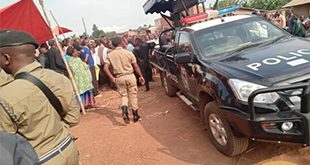
Kampala, Uganda | THE INDEPENDENT | President Yoweri Museveni has advised pastoralists in Ngoma cattle corridor in Nakaseke to embrace zero-grazing rather free-range system.
According to Nakaseke district, there are over 230,000-300,000 cows in the district, most of them are grazed using free-range system.
However, President Museveni says that the free-range is a backward system and wastage of land.
While addressing a rally at Ngoma sub-county headquarters, Museveni asked the pastoralists in Ngoma cattle corridor to embrace the zero-grazing where many heads of cattle can be kept within confined place and fed on pastures. The Ngoma cattle corridor comprises of Ngoma, Kinyogogga, Wakyato sub-counties and Ngoma town council.
Museveni explained that with free-range system it’s difficult to rear over 300 heads of cattle in a square mile but in zero-grazing, you can keep over 5000 heads of cattle within the same piece of land.
Enock Nyongore a pastoralist in Ngoma town council says that the President’s message is timely because it’s increasingly becoming difficult to get huge chunks of land for free-range system.
Nyongore explains that there is pressure on land within families and communities hence the need to utilize well the available land through adopting practices like zero grazing.
Nyongore, however, adds that there is need by government to officials to sensitize the pastoralists to drop the old practice of free-range system.
Another pastoralist Simon Mubiru of Ngoma town council also welcomed the President’s message saying the zero-grazing will help to address overgrazing on same pastures and animals trampling on it.
Other pastoralists backed the idea saying it will end the land conflicts in the area.
However, there are fears that zero-grazing needs high capital to set up structures for housing cattle and handling them could be a limitation.
Other pastoralists feared that it is also labour intensive which calls for maximum supervision.
*****
URN
 The Independent Uganda: You get the Truth we Pay the Price
The Independent Uganda: You get the Truth we Pay the Price


